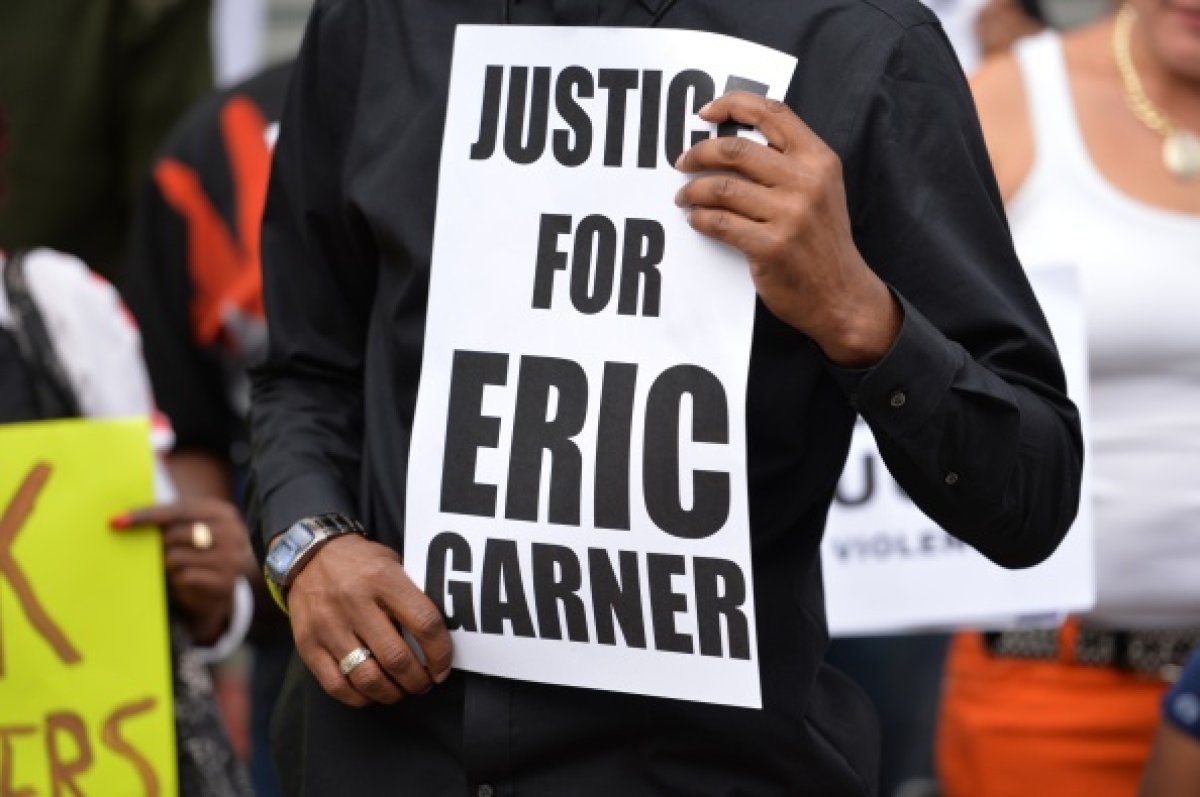One of the NYPD officers involved in the arrest that resulted in the death of Eric Garner admitted to making two mistakes in filing the initial incident report while testifying in a judicial inquiry into the death of the Staten Island dad.
On Monday, arresting officer Justin D'Amico acknowledged two key errors he made in filing the report on Garner's death—writing that no physical force was used in the arrest and charging Garner with a tax-avoidance felony.
Garner was killed on July 17, 2014, after D'Amico's partner, Daniel Pantaleo, put Garner in a prohibited chokehold while arresting him. Video footage of the incident propelled Garner's death into the national spotlight and played an instrumental role in the racial justice movement.
Although Garner was heard saying "I can't breathe" 11 times while officer pinned him down on the sidewalk, D'Amico testified on Monday that he never heard Garner utter the phrase.
Asked who made the mistake on the initial report that stated no physical force was used in the arrest, D'Amico answered, "I did."
D'Amico and Pantaleo had approached Garner back in 2014 on suspicion of selling single cigarettes from packs without tax stamps.
After losing consciousness during the arrest, Garner remained on the sidewalk for seven minutes before an ambulance took him to an area hospital where he was pronounced dead. The medical examiner ruled his death as a homicide.
Following his death, Garner was found to only posses four sealed packs of cigarettes and an opened fifth pack that contained 15 cigarettes—a fraction of what would be required by the felony statue cited in D'Amico's report.
A felony charge typically applies to those in possession of at least 10,000 cigarettes, 22,000 cigars or more than 400 pounds of tobacco. Under state law, Garner could have not been guilty of more than a misdemeanor.

On Tuesday, D'Amico told Gideon Oliver, a lawyer for Garner's mother, that despite the fact that it was his job to address untaxed cigarette conditions, he "didn't understand the specific charge."
"[The charge] was a total mistake," D'Amico said. "Due to the circumstances, I wasn't thinking clearly. I may have rushed the paperwork a bit."
D'Amico testimony is part of a judicial inquiry that began Monday—more than seven years since Garner's death—after Garner's family filed a request to investigate his death, using a process unique to New York City, which reviews cases of alleged neglect by public officials.
It is the first time the provision of the city charter has been invoked in more than 100 years.
While the process does not hold potential for new discipline or settlements, Garner's family, who reached a $5.9 million settlement with the city in 2015, hope it will bring more accountability from police officials.
"Nobody will be charged or found liable. It's about transparency. It's about creating a record. It's about letting the public better understand what happened, and what did not happen, seven years ago," Manhattan Supreme Court Justice Erika Edwards, who is presiding over the inquiry, said on Monday.
Pantaleo was fired from the force five years after the arrest, but was not criminally charged.
Joseph Reznick, head of the NYPD's Internal Affairs Bureau, said that while he "questioned the felony charge right from the beginning," the bureau did not investigate D'Amico for the false charge because officials didn't believe there was "an ill intent on [D'Amico's] part to either deceive or create something that wasn't there."
Reznick testified that there was "no cover-up" in the internal investigation into the officers involved in Garner's death, but directed his condolences to Garner's mother, Gwen Carr.
"There was no cover-up in this case here," he said. "Ms. Carr, as a father of three sons, I'm sorry. I cannot imagine how you must feel about the incident. If I had the power to turn back the clock and go back to July 17, 2014, and change the circumstances, I would."
Uncommon Knowledge
Newsweek is committed to challenging conventional wisdom and finding connections in the search for common ground.
Newsweek is committed to challenging conventional wisdom and finding connections in the search for common ground.
About the writer
Katherine Fung is a Newsweek reporter based in New York City. Her focus is reporting on U.S. and world politics. ... Read more
To read how Newsweek uses AI as a newsroom tool, Click here.








